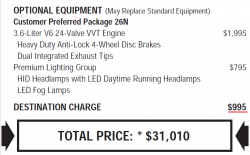— A Chrysler destination charge lawsuit alleges FCA makes a profit from the destination fees charged to customers who purchase new vehicles from dealerships.
The class action lawsuit alleges it is deceptive, unfair or fraudulent for the automaker to list a destination charge that is more than the cost of delivering the vehicle to the dealership.
The plaintiffs also assert Chrysler violates state laws because it fails to explain to each customer how the destination fee reflects the amount charged to a dealer and not the real cost of transporting the vehicle.
And the lawsuit alleges a customer cannot negotiate pricing of the destination charge, and the window labels are misleading.
The window sticker informs consumers about several features of a vehicle including pricing and the amount of the destination charge.
"Plaintiffs bring this class action lawsuit on behalf of themselves and other purchasers of new, model-year 2018 and later Chrysler, Jeep, Dodge, Ram, Fiat and Maserati-brand vehicles distributed for sale in the United States by FCA." — Chrysler destination charge lawsuit
FCA Destination Charge Lawsuit Dismissed
FCA argues the plaintiffs have not alleged a deceptive or unfair practice because the destination charges listed on the vehicles were "the actual amount charged to the dealership, and FCA did not have a duty to provide a more detailed explanation of the destination charge."
Chrysler argues no reasonable consumer would believe the destination charge reflected only the cost of transporting the vehicle and included no profit for the manufacturer.
And the judge agreed.
“Reasonable or average consumers would not be surprised to learn that the price of goods often includes profit for the seller. The term ‘Destination Charge’ does not reasonably imply an absence of profit.” — Judge Todd M. Hughes
The judge also ruled the FCA destination charge was accurately listed as a separate line item on the Monroney stickers (window labels) as required by federal law. In addition, the judge found the plaintiffs agreed to pay the price when contracting with the dealers to buy or lease their vehicles.
The plaintiffs contend the term "destination charge" is "deceptive, unfair, or fraudulent," but the judge ruled the term simply makes clear that it covers what the manufacturer charges for transporting the vehicle.
According to the judge, "there is no allegation that the amount of any destination charge was more than what the manufacturer charged to the dealerships. Thus, using the term “destination charge” to refer to the amount FCA charged the dealers is not deceptive or unfair."
Judge Hughes also found the plaintiffs have not alleged facts showing the listed destination charge was important in their decisions to purchase their vehicles.
And there is no evidence they would not have purchased or leased their vehicles had FCA disclosed there was profit built into the destination charge.
The original Chrysler class action lawsuit was filed by these owners. Included are the destination charges for the vehicles.
- Perry and Wendy Beeney / Illinois / 2020 Dodge Journey Crossroad ($1,495) — 2021 Jeep Renegade Trailhawk ($1,495) — 2022 Ram 2500 Power Wagon ($1,795)
- Nathan Benefield / Missouri / 2019 Ram 1500 Laramie ($1,695) — 2022 Ram 1500 TRX ($1,795)
- Trevor Cole / Georgia / 2021 Dodge Charger ($1,495)
- Robert Collingwood / Ohio / 2021 Ram 1500 Big Horn ($1,695)
- Gary Dutkowski / Pennsylvania / 2021 Ram 2500 Power Wagon ($1,695)
- Billy E. Rowles Jr. / Texas / 2020 Dodge Ram 1500 Big Horn ($1,695)
- Darell Upshaw / Florida / 2018 Dodge Challenger SXT ($1,095) — 2021 Jeep Wrangler Sport ($1,495)
The Chrysler destination charge class action lawsuit was filed in the U.S. District Court for the District of Delaware: Beeney, et al., v. FCA US, LLC, et al.
The plaintiffs are represented by the Bifferato Firm, Handley Farah & Anderson PLLC, Gibbs Law Group LLP, and Baron & Herskowitz.

